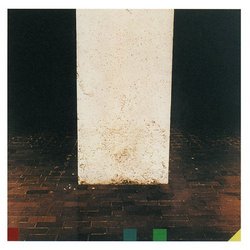| All Artists: K. Leimer Title: Imposed Order Members Wishing: 2 Total Copies: 0 Label: Palace of Lights Original Release Date: 3/12/1983 Re-Release Date: 12/28/1999 Genres: Dance & Electronic, Special Interest Style: Electronica Number of Discs: 1 SwapaCD Credits: 1 UPC: 634479285486 |
Search - K. Leimer :: Imposed Order
 | K. Leimer Imposed Order Genres: Dance & Electronic, Special Interest
The compositional approach contemporizes more traditional methods of theme and variation by making the individual components completely modular and interchangeable. By working from a strictly defined set of harmonic and rh... more » |
Larger Image |
CD Details
Synopsis
Product Description
The compositional approach contemporizes more traditional methods of theme and variation by making the individual components completely modular and interchangeable. By working from a strictly defined set of harmonic and rhythmic components, the music of "IO" added an organizational discipline often absent from ambient music. Instead of relying on more typical self-organizing systems, such as open or closed loops, the music for Imposed Order was largely built by recombining a set of elements in different ways. Whether voiced differently, played at different speeds or in different directions, most of the pieces are the result of changing the relationships between a library of elements ? "like rearranging he furniture in a room." Digitally remastered release of the 1983 vinyl. "Almost everyone in the music industry has some knowledge of the technical aspects of getting sounds onto tape. Most musicians are content if they can go into the studio and get something that sounds like a live performance. It seems almost backwards that the people who use tape as a compositional medium distinct and separate from live performance are the ones who are considered eccentric. In 1980, K. Leimer said his music 'deliberately sits on the border between "ambient" music and "event" music.' His new work, Imposed Order, continues in this direction. It is a brilliant combination of events and ambient sounds. These nine pieces are more than simply sound textures - they move from one place to another, have definite (though not expected) beginnings and endings, and are all around five minutes long. Wajang kulit, The Human Condition, and Life of the Poet have bouncy rhythms similar to Leimer's work with Savant (The Neo-Realist), and Three Forms of Decay and Simple Hierarchies continue with the interesting process work and atmospherics of Closed System Potentials.Wajang kulit seems to be based partly on Balinese music; there are Chinese or Japanese influences in Water Music.
This music isn't the kind that aggressively pulls you in. It requires a certain amount of listening, but it is not hidden in the intentional obscurity or obliqueness that shadows some contemporary intellectual work. Because Leimer hasn't compromised to keep in step with whatever's currently popular, Imposed Order may not have immediate commercial success, but it will probably prove to be quite successful over a long period of time. Anyway, these sounds are better than money and fame!
Like Brian Eno, K. Leimer comes from a visual art background. He says that he got into music several years ago because it was something he knew nothing about - the technical aspects, at least. Perhaps having music as a second artistic language made it easier for him to stick to his ideals and theories, rather than turning it into a job; or maybe it gave him the perspective to be able to look at the tools rather than merely using them as a means to a predetermined end. While a lot of people use synthesizers, drum machines and advanced studio technology to create pop songs about love, cars, or even politics (1984 being an excellent jumping-off point), Leimer continues his subtle persistence of sound and vision. It's as if he's saying that one way we might be able to keep from destroying ourselves and the world is to slow down and think about it." ? Neil S. Kvern
This music isn't the kind that aggressively pulls you in. It requires a certain amount of listening, but it is not hidden in the intentional obscurity or obliqueness that shadows some contemporary intellectual work. Because Leimer hasn't compromised to keep in step with whatever's currently popular, Imposed Order may not have immediate commercial success, but it will probably prove to be quite successful over a long period of time. Anyway, these sounds are better than money and fame!
Like Brian Eno, K. Leimer comes from a visual art background. He says that he got into music several years ago because it was something he knew nothing about - the technical aspects, at least. Perhaps having music as a second artistic language made it easier for him to stick to his ideals and theories, rather than turning it into a job; or maybe it gave him the perspective to be able to look at the tools rather than merely using them as a means to a predetermined end. While a lot of people use synthesizers, drum machines and advanced studio technology to create pop songs about love, cars, or even politics (1984 being an excellent jumping-off point), Leimer continues his subtle persistence of sound and vision. It's as if he's saying that one way we might be able to keep from destroying ourselves and the world is to slow down and think about it." ? Neil S. Kvern

 Track Listings (9) - Disc #1
Track Listings (9) - Disc #1